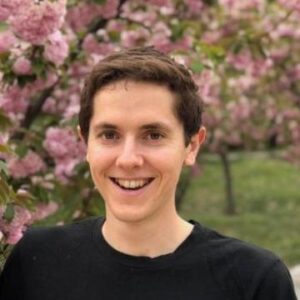Events
Colloquium
Efficient variational inference with generative models
 |
Speaker: Grant M. Rotskoff (Stanford) Assistant Professor of Chemistry Stanford University Thursday, March 27, 2025 11:30AM - 1:00PM Lunch at 11:30am in 1307
Talk at 12:00pm in 1327 Location: Yale Institute for Foundations of Data Science, Kline Tower 13th Floor, Room 1327, New Haven, CT 06511 and via Webcast: https://yale.hosted.panopto.com/Panopto/Pages/Viewer.aspx?id=54817ab1-65be-4967-959a-b29e00fb78d8 |
Abstract: Neural networks continue to surprise us with their remarkable capabilities for high-dimensional function approximation. Applications of machine learning now pervade essentially every scientific discipline, but predictive models to describe the optimization dynamics, inference properties, and flexibility of modern neural networks remain limited. In this talk, I will introduce several approaches to both analyzing and building generative models to augment Monte Carlo sampling and sampling high-dimensional distributions. I will focus, in particular, on two applications from chemistry: sampling conformational ensembles of disordered protein domains and molecular optimization. I will also introduce a self-distillation strategy for large scale models that shares conceptually similarities to preference optimization with reinforcement learning, but does not require proximal optimization (PPO) and outperforms direct preference optimization and (DPO).
Speaker bio: Grant Rotskoff studies the nonequilibrium dynamics of living matter with a particular focus on self-organization from the molecular to the cellular scale. His work involves developing theoretical and computational tools that can probe and predict the properties of physical systems driven away from equilibrium. Recently, he has focused on characterizing and designing physically accurate machine learning techniques for biophysical modeling. Prior to his current position, Grant was a James S. McDonnell Fellow working at the Courant Institute of Mathematical Sciences at New York University. He completed his Ph.D. at the University of California, Berkeley in the Biophysics graduate group supported by an NSF Graduate Research Fellowship. His thesis, which was advised by Phillip Geissler and Gavin Crooks, developed theoretical tools for understanding nonequilibrium control of the small, fluctuating systems, such as those encountered in molecular biophysics. He also worked on coarsegrained models of the hydrophobic effect and self-assembly. Grant received an S.B. in Mathematics from the University of Chicago, where he became interested in biophysics as an undergraduate while working on free energy methods for large-scale molecular dynamics simulations.
Hosted by John Sous.
Add To: Google Calendar | Outlook | iCal File
- Colloquium
Submit an Event
Interested in creating your own event, or have an event to share? Please fill the form if you’d like to send us an event you’d like to have added to the calendar.
